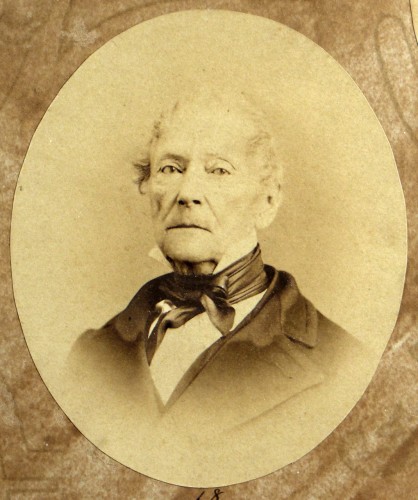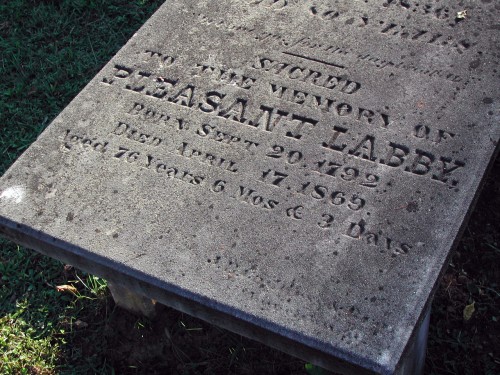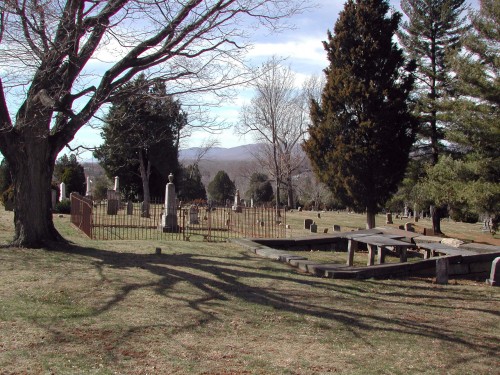
Photograph of Pleasant Labby, taken in 1868 by Tanner & Van Ness of Lynchburg
Courtesy of the Lynchburg Museum System
Excerpted from the “Reminiscences” series of the Lynchburg News, published March 8, 1896. The author is unknown.
Among those who lived here thirty years ago was Capt. Pleasant Labby, than whom no citizen was better known, both in his public career and his private life, which was one of singular purity. His remains are in the original one-acre [of Old City Cemetery] granted by John Lynch to the city, and with such of his family as preceded him to “that borne from which no traveler returns,” within a substantially enclosed lot he rests after a long and active life.
The graves in this lot are nearly all covered by large marble slabs mounted on marble pedestals—a method of marking the resting places of the dead many years ago that has now almost entirely gone out of vogue.
Captain Labby was born September 20th, 1792, and died April 17, 1869. His place of birth was in Hanover County. Coming to Lynchburg from Richmond about 1810, he at once entered into the manufacture of tobacco, being one of the pioneers in that business, in which he continued during his life, and in which he amassed a competency. About the year 1840, there came to Lynchburg from New York, Dr. John Bovee Dods, a man of talent, who had established a wide reputation as a Universalist preacher, a “mesmerist” and a “mesmeric healer,”—a science then in its infancy, which is now denominated “hypnotism.” Dr. Dods, in addition to his exhibitions of mesmerism, began preaching here the doctrine of universal salvation, and succeeded in making quite a number of proselytes to his easy method of entering upon eternal life. He organized a church, of which Captain Labby became an active member. So enthusiastic did he become in the promulgation of this doctrine, that he began preaching it, first in his own office to a few friends and afterwards in Masonic hall.
 What is now Odd Fellows’ hall was erected as a Universalist church largely through the instrumentality of the subjects of this sketch. The society has long since been “numbered among the things that were and are not,” while many of the original members of the organization are within the pale of other churches. It is but just, however, to the memory of Captain Labby to say that he died in the faith that he had preached. His was a kindly, genial, benevolent nature, doing good to others as he had opportunity and performing well and faithfully all the duties of a good citizen. He was fond of disputation upon his favorite theology with his friends of a more orthodox faith, but it was always conducted with decorum and respect for the views of others, and with an inimitable humor of which he possessed an inexhaustible fund.
What is now Odd Fellows’ hall was erected as a Universalist church largely through the instrumentality of the subjects of this sketch. The society has long since been “numbered among the things that were and are not,” while many of the original members of the organization are within the pale of other churches. It is but just, however, to the memory of Captain Labby to say that he died in the faith that he had preached. His was a kindly, genial, benevolent nature, doing good to others as he had opportunity and performing well and faithfully all the duties of a good citizen. He was fond of disputation upon his favorite theology with his friends of a more orthodox faith, but it was always conducted with decorum and respect for the views of others, and with an inimitable humor of which he possessed an inexhaustible fund.
Special thanks to Doug Harvey and Laura Lembas for the portrait of Labby

